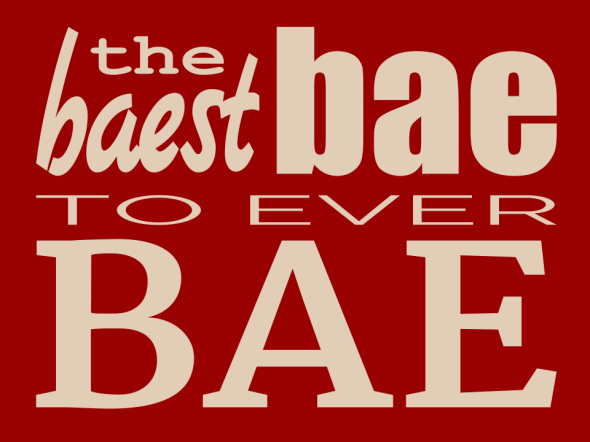Over the past couple of years, the term bae has achieved widespread usage. While the noun form has been around for more than 10 years, adjectival and verbal uses, along with other related forms, have more recently started popping up to describe the people and things we love, or at least like-like. Twitter, in particular, is rife with interesting new uses of the term. The popular social media platform has been used to mine language change for years and has inspired some recent linguistic scholarly research.
Dictionary.com defines the noun bae as: “Slang. an affectionate term used to address or refer to one’s girlfriend, boyfriend, etc.” Many have debated the etymology of bae, some insisting that it derives from the acronym “Before Anyone Else.” The earliest evidence of this connection on Twitter is from a July 19, 2011, tweet, making “Before Anyone Else” a backronym of bae, which first surfaced in rap music and on Urban Dictionary in the early- to mid-2000s. A much more likely etymological explanation is that bae is a shortening of baby or babe.
When bae appears as a noun, its meaning is relatively set: It’s a term of endearment. However possibilities abound as bae moves into to other parts of speech. These days bae has gotten a lot of mileage out of its robust use as an adjective. My guess is that adjectival bae (or what I’ll call adjectival bae for now) at first pointed to the original boyfriend/girlfriend/significant other sense, as in the following examples:
But adjectival bae goes beyond literal significant others, and into the realm of fantasy significant others. If you were to call a celebrity bae, there’s an implicit understanding that this is make-believe; you don’t actually know this person (David Beckham) and you probably wouldn’t date him if you did (unless you are a former Spice Girl). And in addition, bae can be used to describe people who are cool or hot or stylish or wonderful, whether or not you have any romantic interest in them.
Things can also be bae. In fact, this is so common, it has sparked Internet outrage.
Sometimes the actual part of speech of emerging slang can be hard to identify. Just look at the debates among linguists surrounding the part of speech of because X. While in the above examples, bae resembles an adjective, is bae really an adjective? Let’s take a closer look at “pizza is bae.” The following constructions commonly appear:
- Pizza is bae.
- Pizza is so bae.
- Pizza is my bae.
- Pizza is the bae.
All of these examples express the same sentiment: “I love pizza,” but there’s something funny about the first example. “Pizza is bae” could be like “pizza is good,” in which case bae would be an adjective, or it could be like “pizza is food,” in which case bae would be a noun. In the second example, bae is clearly an adjective (“pizza is so bae” is like “pizza is so good”), and in the last two examples, bae is clearly a noun (“pizza is my/the food”). But is there a so, my, or the being implied in “pizza is bae”? Returning to Ashley Ford’s tweet “Oh, he wants Meg Ryan to be Bae so he don’t want to tell her he’s Rich Bookstore Man?” we see that Ford capitalizes bae, treating it as a proper noun. Is this because bae is part of the implied noun phrase “his bae?” Or does bae stand on its own as an adjective here? We’d have to ask the individual tweeters to know for sure, and then, they might not even have an answer. With just the written source material, the part of speech remains ambiguous.
Nonetheless, bae has shown itself to be a very productive new element of English. Not only does it straddle parts of speech, but related forms of bae have emerged as well. You can be baeless or baeful, and you can achieve baeness and baedom. You can be super-, uber-, or extra-bae.
Bae can also be used as a phrasal verb, as in “bae it out”:
You can even use baenoculars.
Bae is used as a verb meaning “to make someone your significant other,” as in “to bae or nah to bae.” While William Shakespeare gets credit for popularizing countless terms in English, it’s safe to say he did not coin the verb use of bae.
Bae is sometimes also used as a superlative, as seen above in the pizza examples. People or things can be “the baest” or “the bae.”
While bae might be the bae-n of some people’s existence, the Twitterverse and beyond have made bae an extremely adaptable and productive term, far more flexible than baby or babe. But as bae achieves high-levels of pop-culture saturation, can it maintain its mighty baedom? Will what was once bae become baeless? Has bae already lost its baeity? For the next few years, I’ll be watching with bae-ted breath.
A version of this post appeared on Dictionary.com.
Follow @lexiconvalley on Twitter or on Facebook.
